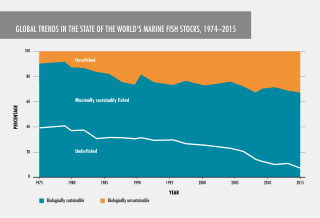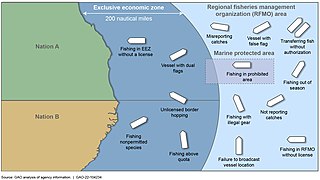| Signed | 4 December 1995 – 4 December 1996 |
|---|---|
| Location | New York City, United States of America |
| Effective | 11 December 2001 [1] |
| Condition | 30 ratifications |
| Signatories | 59 |
| Parties | 91 [2] |
The United Nations Fish Stocks Agreement (UNFSA), otherwise known as the Straddling Fish Stocks Agreement (formally, the Agreement for the Implementation of the Provisions of the United Nations Convention on the Law of the Sea of 10 December 1982 relating to the Conservation and Management of Straddling Fish Stocks and Highly Migratory Fish Stocks) is a multilateral treaty created by the United Nations to enhance the cooperative management of fisheries resources that span wide areas, and are of economic and environmental concern to a number of nations. As of December 2016, the treaty had been ratified by 91 parties, which includes 90 states and the European Union. [2]
Straddling stock are fish stocks that migrate through, or occur in, more than one exclusive economic zone. The Agreement was adopted in 1995, and came into force in 2001. [1]
Highly migratory fish is a term which has its origins in the United Nations Convention on the Law of the Sea. It refers to fish species which undertake ocean migrations and also have wide geographic distributions, and usually denotes tuna and tuna-like species, shark, marlin and swordfish. Straddling fish stocks are especially vulnerable to overexploitation because of ineffective management regimes and noncompliance by fishing interests.[ citation needed ]

Fish migration is mass relocation by fish from one area or body of water to another. Many types of fish migrate on a regular basis, on time scales ranging from daily to annually or longer, and over distances ranging from a few metres to thousands of kilometres. Such migrations are usually done for better feeding or to reproduce, but in other cases the reasons are unclear.

The Common Fisheries Policy (CFP) is the fisheries policy of the European Union (EU). It sets quotas for which member states are allowed to catch each type of fish, as well as encouraging the fishing industry by various market interventions. In 2004 it had a budget of €931 million, approximately 0.75% of the EU budget.

The Turbot War was an international fishing dispute and bloodless conflict between Canada and Spain and their respective supporters.

Fish stocks are subpopulations of a particular species of fish, for which intrinsic parameters are traditionally regarded as the significant factors determining the stock's population dynamics, while extrinsic factors are traditionally ignored.
The Northwest Atlantic Fisheries Organization (NAFO) is an intergovernmental organization with a mandate to provide scientific advice and management of fisheries in the northwestern part of the Atlantic Ocean. NAFO is headquartered in Halifax, Nova Scotia, Canada.
The International Commission for the Conservation of Atlantic Tunas (ICCAT) is a tuna regional fishery management organisation, responsible for the management and conservation of tuna and tuna-like species in the Atlantic Ocean and adjacent seas. The organization was established in 1966, at a conference in Rio de Janeiro, Brazil, and operates in English, French and Spanish. The organisation has been strongly criticised by scientists for its repeated failure to conserve the sustainability of the tuna fishery by consistently supporting over-fishing – an internal review branded ICCAT's policies on the eastern Atlantic bluefin tuna fishery a "travesty of fisheries management", and an "international disgrace". Conservationists often refer to ICCAT as "The International Conspiracy to Catch All Tuna".
A regional fishery body (RFB) is a type of international organization that is dedicated to the sustainability of fishery resources in a particular region, or of highly migratory species, whose such capacity has been recognized by the UN Food and Agriculture Organization. An RFB is classified as one of the following two types:

Illegal, unreported and unregulated fishing (IUU) is an issue around the world. Fishing industry observers believe IUU occurs in most fisheries, and accounts for up to 30% of total catches in some important fisheries.
Satya N. Nandan, CF, CBE, was a diplomat and lawyer from Fiji specializing in ocean affairs, was Chairman of the Western and Central Pacific Fisheries Commission, where he served a two-year term commencing 1 January 2009. Previously, he was the first Secretary-General of the International Seabed Authority, a position he held for three consecutive four-year terms from March 1996 until December 2008.
The South East Atlantic Fisheries Organisation (SEAFO) is an organization that maintains controls over fishing and fishing related acts in the Southeastern Atlantic Ocean.

As with other countries, New Zealand’s 200 nautical miles exclusive economic zone gives its fishing industry special fishing rights. It covers 4.1 million square kilometres. This is the sixth largest zone in the world, and is fourteen times the land area of New Zealand.

As with other countries, the 200 nautical miles (370 km) exclusive economic zone (EEZ) off the coast of the United States gives its fishing industry special fishing rights. It covers 11.4 million square kilometres, which is the second largest zone in the world, exceeding the land area of the United States.

The Western and Central Pacific Fisheries Commission (WCPFC) is both a general and a tuna regional fisheries management organisation established to conserve and manage tuna and other highly migratory fish stocks across the western and central areas of the Pacific Ocean. Its full name is Commission for the Conservation and Management of Highly Migratory Fish Stocks in the Western and Central Pacific Ocean. It commenced operations in late 2005, and its secretariat is based in Pohnpei, in the northern Pacific state of the Federated States of Micronesia.
Dr. Moritaka Hayashi is an international lawyer, scholar and author, who is widely considered a leading expert on the impact of human activity on the world's oceans. Over a period of nearly 40 years, he has published extensively on issues involving the law of the sea, including overfishing, maritime shipping and maritime security. In 2008, he served on an international commission that generated controversy by calling for the immediate suspension of bluefin tuna fishing in the Eastern Atlantic Ocean and Mediterranean Sea. He has also served as an official at the United Nations and as a diplomat for the Permanent Mission of Japan to the United Nations.

The Pacific Islands Forum Fisheries Agency (FFA) is an intergovernmental agency established in 1979 to facilitate regional co-operation and co-ordination on fisheries policies between its member states in order to achieve conservation and optimum utilisation of living marine resources, in particular highly migratory fish stocks, for the benefit of the peoples of the region, in particular the developing countries. The office campus is located in Honiara, Solomon Islands
High seas fisheries management refers to the governance and regulation of fishing activities in areas beyond national jurisdiction, often referred to as the ‘high seas’. The 1982 United Nations Convention on the Law of the Sea (UNCLOS) and the 1995 United Nations Fish Stock Agreement (UNFSA) provide the international legal framework for the regulation of fishing activities in areas beyond national jurisdiction. The United Nations Fish Stock Agreement delegates responsibility for conservation and management of fish stocks to regional fisheries management organizations (RFMOs) each governing a geographical area of the high seas.

The Directorate General of Marine and Fisheries Resources Surveillance is a government agency under the management of the Ministry of Marine Affairs and Fisheries of Indonesia. Formally established on 23 November 2000 according to Presidential Decree No. 165/2000, the PSDKP is the agency responsible for supervising the marine and fishery resources of the Republic of Indonesia. The main mission of PSDKP is the prevention of Illegal, unreported and unregulated fishing in Indonesian waters, which has caused a substantial loss for Indonesia's fishing industry. In its mission to prevent illegal fishing, PSDKP has conducted joint-operations with the Indonesian Navy, Water Police, Sea and Coast Guard, the Maritime Security Agency and Customs. PSDKP is however is not associated with these agencies.

Of the twelve species of billfish, there are six species of Billfish in the Indian Ocean.

The exclusive economic zone of Canada is the area of the sea in which Canada has special rights regarding the exploration and use of marine resources, as prescribed by the 1982 United Nations Convention on the Law of the Sea.
A mar presencial or heritage marine reserve is a zone of influence demarcated by a maritime country in the high seas adjacent to its exclusive economic zone (EEZ). The objective of this oceanopolitical concept or doctrine, is to signal to third parties where the coastal country's interests are, or could be directly involved.